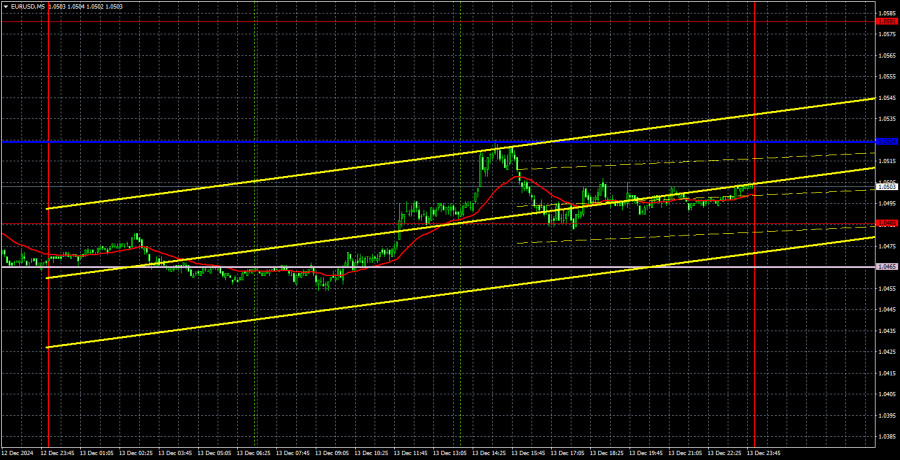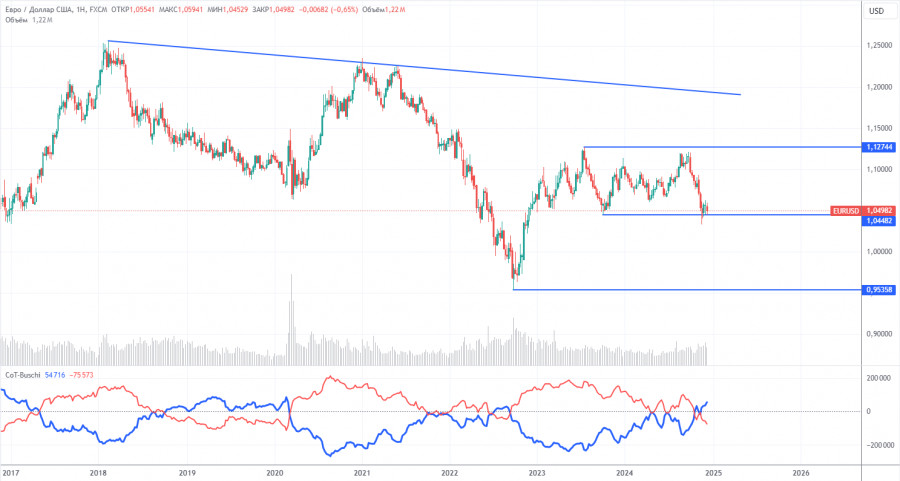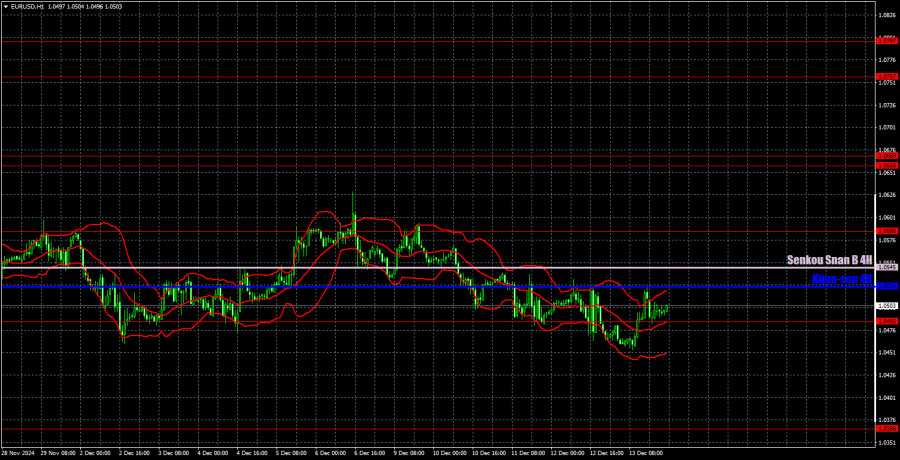EUR/USD 5-Minute Analysis

On Friday, the EUR/USD pair attempted to consolidate below the previous low, marking the lower boundary of the horizontal channel where the price has been stuck for three weeks. However, this attempt failed.
It is worth recalling that on Thursday, the European Central Bank concluded its final meeting of the year, and the outcomes were disappointing for the euro. First, the ECB cut rates again. Second, Christine Lagarde highlighted the weakness of the Eurozone economy, even stating that the already absent growth might slow further. Third, she clarified that there is currently no basis for pausing monetary easing.
Let's note that the Federal Reserve's rate cuts no longer hold much significance for the dollar because the market has already priced the entire monetary policy easing cycle in the U.S. However, the ECB's rate cuts carry significant weight for the euro—especially for an "overbought and unjustifiably expensive euro," which has been depreciating for 16 years.
The flat trend persists on the hourly timeframe, and the price could climb back to the 1.0585 level or slightly higher in the near term. However, this does not change the medium-term outlook for the euro. We believe that in the coming months, the euro could drop to the 1.00–1.02 range.
On Friday, opening any positions made little sense. From the morning, the price was stuck in the range of 1.0465–1.0524 between the Senkou Span B and Kijun-sen lines. The 1.0485 level was also within this range, making the distance between all these "price markers," where signals could have formed, too narrow to expect meaningful movement. Moreover, the pair's volatility has recently declined again...
COT Report

The latest COT report, dated December 10, provides a clear picture of market sentiment. As shown in the illustration above, the net position of non-commercial traders has long remained bullish, but bears have recently gained dominance. Two months ago, the number of open short positions among professional traders increased sharply, turning the net position negative for the first time in a long while. This indicates that the euro is now being sold more often than bought.
We still see no fundamental factors supporting the euro's strengthening, and technical analysis indicates the price is in a consolidation zone—essentially, a flat market. On the weekly timeframe, it's clear that since December 2022(!!!), the pair has been trading between 1.0448 and 1.1274. Therefore, a further decline remains more likely. Breaking below the 1.0448 level will open new territory for a euro sell-off.
The red and blue lines have crossed and switched positions relative to one another, signaling a bearish trend in the market. During the last reporting week, the number of longs in the non-commercial group decreased by 10,300, while shorts increased by 7,700. As a result, the net position fell by another 18,000.
EUR/USD 1-Hour Analysis

On the hourly timeframe, the pair continues to correct within a visible horizontal channel. The correction is unfolding slowly and with complexity, as anticipated. We still believe there is no justification for significant euro strength and expect the correction to conclude, followed by a resumption of the downtrend toward price parity. For instance, a break below 1.0460 would signal a potential renewal of the bearish trend.
For trading, the following levels are identified: 1.0269, 1.0340–1.0366, 1.0485, 1.0585, 1.0658–1.0669, 1.0757, 1.0797, 1.0843, 1.0889, and 1.0935, along with the Senkou Span B (1.0545) and Kijun-sen (1.0524) lines. The Ichimoku indicator lines may shift during the day, so traders should account for this when identifying signals. Don't forget to place a Stop Loss order at breakeven once the price moves 15 pips in the desired direction. This will protect against potential losses if the signal turns out to be false.
On Monday, Germany, the Eurozone, and the U.S. will release PMI indices for the services and manufacturing sectors. Additionally, ECB President Christine Lagarde is scheduled to speak. However, we don't expect Lagarde to share anything new, as the ECB meeting occurred just last Thursday. The Eurozone and German PMIs will be the most notable events of the day.
Illustration Explanations:
- Support and Resistance Levels (thick red lines): Key areas where price movement might stall. Not sources of trading signals.
- Kijun-sen and Senkou Span B Lines: Ichimoku indicator lines transferred from the H4 timeframe to the hourly chart, serving as strong levels.
- Extreme Levels (thin red lines): Points where the price has previously rebounded. They can serve as trading signal sources.
- Yellow Lines: Trendlines, channels, or other technical patterns.
- Indicator 1 on COT Charts: Reflects the net position size of each trader category.
from Forex analysis review https://ift.tt/lSpDHcO
via IFTTT
